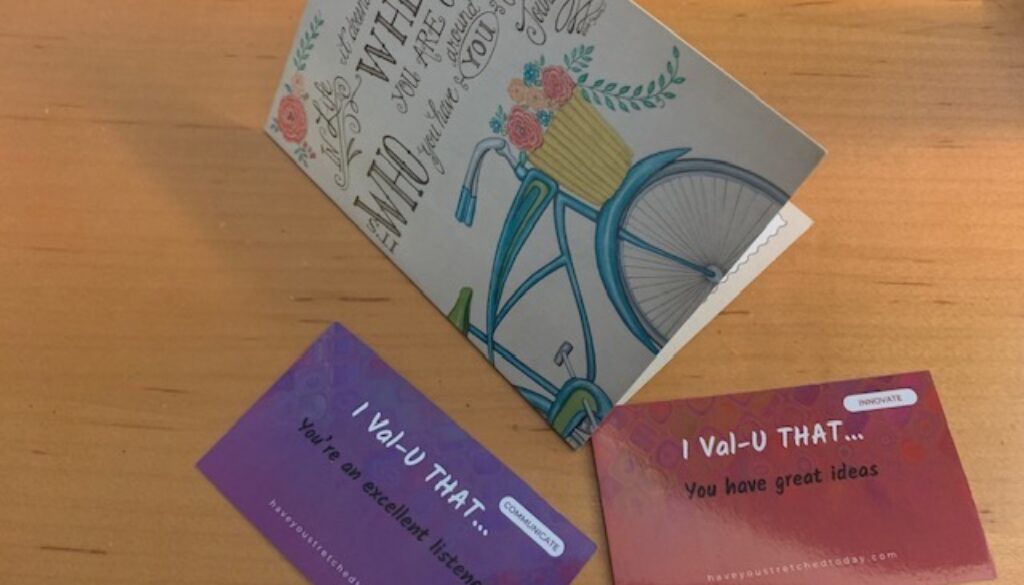Gratitude with Specificity

This weekend I received a beautiful card in the mail from my dear friend Sonal Sheth Zawahri that truly made my day. Admittedly, my love language is “words of affirmation”, so cards, hand-written notes and messages feed my gratitude soul. She also included 2 of her signature Tru You Val-U cards that celebrate talents, characteristics, values, and strengths of an individual. They are designed for sharing and honoring gratitude with specificity. It’s the ultimate pay-it-forward gesture to remind people of what makes them special and unique.
I am making a conscious effort to be more grateful on a regular basis, to acknowledge people authentically, and to show how much I value and regard them and the contributions they make.
A Harvard Business Review article by Christopher Littlefield posits that giving and receiving compliments plays a major part in forming and stewarding workplace relationships. He cites that while 88% associate being recognized as feeling valued, 70% of people feel embarrassment or discomfort with the process of giving and receiving a compliment.
A Compliment is a Gift
There is a time and place for humility, but I have seen many people deflect a compliment meant for them and redirect the praise to someone else. It’s time to reframe the uncomfortable feeling you may get when you receive a compliment and consider that the person sharing gracious words is offering you a gift. They took the time to address you and share authentic praise. Take the opportunity to listen and reciprocate your gratitude. Practice your thank you responses, so you don’t get flustered if a compliment comes your way. Littlefield offers these suggestions:
• “Thank you, it makes my day to hear that.”
• “I really put a lot of thought into this, thank you for noticing.”
• “Thank you, I really appreciate you taking the time to express that.”
• “Thank you, I am happy to hear you feel that way!”
Give Credit Where Credit is Due
We’ve all been in situations where someone else takes credit for work, or an achievement that they did not earn. It’s inappropriate behavior. Full stop. You can and should take the high road by speaking up on behalf of the person who did the work and should receive the accolades by adding to the conversation. Here are a few script ideas to consider:
• “I want to acknowledge the work XX did on this project to get us to this big win.”
• “It’s important to recognize the contribution XX made in this effort.”
• “I’d like to make sure we single out XX for their incredible work on this project.”
If you are identified as the team leader and given praise for work accomplished by your team, be sure to share the praise with your team and help them understand the win was not yours alone.
• “Thank you for noticing, it’s great to hear your kudos. Everyone on our team has been working intensely on this over the last few weeks. I will share your feedback in our next meeting.”
Be Specific
I am not a fan of gratuitous praise just to make people feel good. I reserve my praise for well-earned examples of good work, and I honor the receiver with specificity. The general “good job” with a fist-bump or high-five feels good for a few seconds but leaves the receiver feeling unclear about what they did well.
Honor the receiver of your praise with details, so they can understand what they did well and in the best-case scenario, strive to do it again.
“Jane – you did a beautiful job with your presentation to the Board. Your slides were compelling with data that was clear and actionable. You conveyed your message with relatable stories that the participants will remember. They engaged you with questions and suggestions at the end, which really showed they care about the outcome of this project. I was very pleased with your professionalism and poise throughout this important meeting.”
Create a Gratitude Culture
Become a role model for others by sharing specific praise for great work. You can create a culture of recognition by helping people feel valued for their contribution, which provides meaning and fulfillment to their work. A company culture thrives when the individuals live the culture through their behavior on a regular basis.
Let’s all focus on how we can up our gratitude game with authenticity and specificity.






